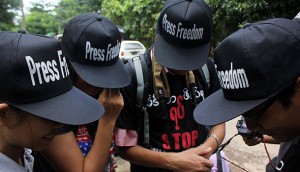Posts Tagged ‘Printing and Publishing Enterprise Law’ (5 found)
Rule By Law: An Analysis of the Use of Legislation to Stifle Civil Society Space in Burma
This paper is primarily an analysis of the raft of legislation that is in the process of being pushed through parliament to target HRDs, activists, protestors and CSOs, and the threat that such legislation poses to their fundamental rights – which Burma is legally bound to respect and protect under the 2008 Constitution. This paper will also look at the current situation of political prisoners to demonstrate how the legislation is being misused in collaboration with a compliant judiciary and the Myanmar National Human Rights Commission […]
• • •BNI Opposed to New Media Law
Burma News International, which consists of various ethnics media groups, opposes the new media law submitted by the Ministry of Information to the People’s Parliament.
“Printers and Publishers Registration Law has allowed the Ministry of Information to control the freedom of media agencies. This can be damaged the right to freedom of the press.” BNI development officer Nan Paw Gay said […]
• • •Myanmar: Press Council Threatens Resignation as Lower House Fails to Amend Dire Press Bill
The Press Council has said that they will resign if the Printing and Publishing Enterprise Law bill, which ARTICLE 19 previously warned would restore prior censorship and full government control, is adopted.
The bill was passed by Myanmar’s lower house of parliament with only minimal changes. ARTICLE 19 urges the upper house and the president not to adopt the bill without further drastic changes […]
• • •Upper House Must Not Approve Proposed Media Law in Its Current Form
Reporters Without Borders regrets the proposed Printing and Publishing Enterprise Law’s adoption by the lower house of parliament (Pyithu Hluttaw) on 4 July as it runs counter to all the interim Press Council’s recommendations and has been widely criticized by the Burmese media.
“We fully support those journalists who are calling for this repressive bill to be abandoned,” Reporters Without Borders said. “The upper house must reject this proposed law in its present form as it does not meet international standards on protection of the media […]
• • •Upper House of Parliament Must Reject the Printing and Publishing Enterprise Law
 On 4 July, the Lower House of Parliament approved the controversial Printing and Publishing Enterprise Law despite strong opposition and criticism by the interim Myanmar Press Council, local media and freedom of expression watchdogs.
On 4 July, the Lower House of Parliament approved the controversial Printing and Publishing Enterprise Law despite strong opposition and criticism by the interim Myanmar Press Council, local media and freedom of expression watchdogs.
The Ministry of Information introduced the draft law in Parliament last March, a week after the Press Council released its own draft Media Law. This came as a surprise as the Ministry’s draft was written in secrecy, presented to the Parliament before any consultation took place and happened despite an earlier agreement that the Press Council would be in charge of drafting the new media legislation.
As a reaction to this clear attempt by the Ministry to bar the Council’s legislation from being presented to the Parliament, local and international media loudly opposed the Printing and Publishing Enterprise Law. The Committee to Protect Journalists said, “If passed in its current form, the draft law will essentially replace Burma’s old censorship regime with a similarly repressive new one.” Article 19 called for the draft law to be withdrawn or rejected by the Parliament “as it would be a major step backwards for freedom of expression and freedom of the media, restoring prior censorship and full governmental control over the press” […]
• • •








 All posts
All posts